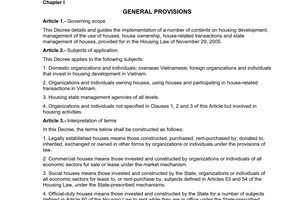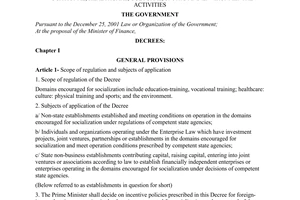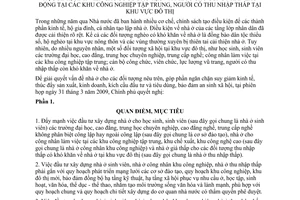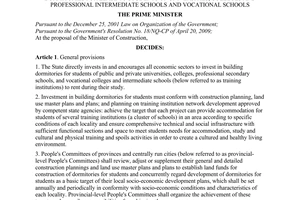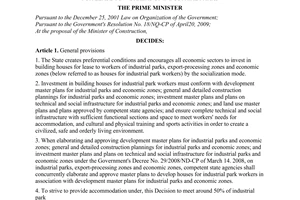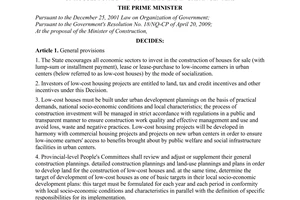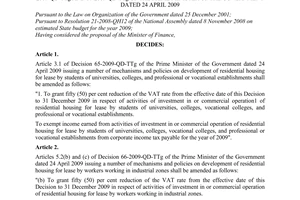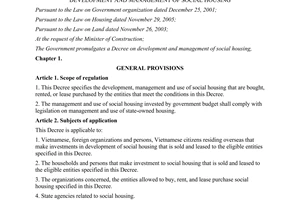Nội dung toàn văn Resolution No. 18/NQ-CP of April 20, 2009, on a number of mechanisms and policies to step up the development of dormitories for trainees and students of training establishments and houses for workers in industrial parks and low-income earners in urban centers.
|
THE
GOVERNMENT |
SOCIALIST
REPUBLIC OF VIET NAM |
|
No. 18/NQ-CP |
Hanoi, April 20, 2009 |
RESOLUTION
ON A NUMBER OF MECHANISMS AND POLICIES TO STEP UP THE DEVELOPMENT OF DORMITORIES FOR TRAINEES AND STUDENTS OF TRAINING ESTABLISHMENTS AND HOUSES FOR WORKERS IN INDUSTRIAL PARKS AND LOW-INCOME EARNERS IN URBAN CENTERS
Over recent years, the State has promulgated many mechanisms and policies to create conditions for all economic sectors, households and individuals to build houses. The housing conditions have been markedly improved for people of all strata, including ethnic minority people, poor households in rural areas and regions frequented by natural disasters. However, for some reasons, a number of social subjects in urban centers, including trainees and students of universities, colleges, professional secondary schools, intermediate vocational training establishments; workers in industrial parks; public servants, armed forces personnel and low-incomer earners, still meet with housing difficulties.
In order to solve the housing problems for the above-said subjects, to contribute to stopping the economic decline, boost production and business, stimulate investment and consumption and ensure social welfare, at its meeting on March 31. 2009, the Government resolves:
Part I
VIEWPOINTS, OBJECTIVES
1. To step up investment in the construction of dormitories for trainees and students (below referred collectively to as students' dormitories) of universities, colleges, professional secondary schools, professional colleges, intermediate vocational training establishments, regardless of whether they are public or non-public (below collectively referred to as training establishments), houses for workers in industrial parks, export processing zones, hi-tech parks (below collectively referred to as industrial park workers' houses) and low-cost houses for low-income earners meeting with housing difficulties in urban centers (below referred collectively to as low-cost houses).
2. The construction of students' dormitories, industrial park workers' houses and low-cost houses must be associated with the development planning on networks of training establishments, planning on industrial parks, new urban centers, ensuring complete technical and social infrastructure in service of dwelling and learning needs as well as cultural, sport and physical training and daily-life activities in order to create a cultured and healthy living environment and to comply with the general and detailed construction planning already approved by competent state agencies.
3. The investment in construction of students' dormitories, industrial park workers' houses and low-cost houses must be based on the practical demands and conform to national socioeconomic conditions as well as local characteristics and situation. The construction must be organized and managed strictly according to regulations, ensuring construction quality, management and use efficiency; and carried out in a public and transparent manner, avoiding losses and waste.
4. To try to meet the housing needs of 60% of students in training establishments and 50% of industrial park workers by 2015.
Part II
SOLUTIONS, MECHANISMS AND POLICIES
I. STUDENTS' DORMITORIES
1. Investment Projects on construction of students’ dormitories will be undertaken mainly by the State with state budget sources (central and local), while the State encourages all economic sectors to invest in the development of students" dormitories by the mode of socialization defined in the Government's Decree No. 69/2008/ND-CP of May 30, 2008, on policies to encourage the socialization of activities in the domains of education, vocational training, healthcare, culture, sports and environment (below referred to as Decree No. 69/2008/ND-CP).
2. Projects on construction of students' dormitories will be carried out mainly in the direction of concentration, meeting the requirement that each project can provide lodgings for students of a number of schools or school groups and complying with local construction planning.
3. The People's Committees of provinces or centrally run cities (below referred to as provincial-level People's Committees) shall organize the management of projects on students' dormitories in their respective localities.
Provincial-level People's Committees shall assign their Construction Services or functional bodies to act as investors of projects on students' dormitories. For investment projects on construction of students' dormitories in the campuses of training establishments, such training establishments will be assigned to act as investors. Investors are allowed to set up students' dormitories project management units or assign functional agencies in localities under law to manage the construction and the exploitation of projects upon the completion of construction
4. The land fund for
construction of students' dormitories will be channeled from the land funds
recovered and compensated for ground clearance under planning; from the 20%
land fund set aside
for construction of social houses in projects on commercial houses or new urban
centers in localities and the existing land funds in the campuses of training
establishments, which are planned for construction of students' dormitories.
Expenses for ground clearance compensation will be channeled from the sources
of land use levies and land rents retained by localities.
5. State budget capital for investment in construction of students' dormitories will be mobilized from government bonds and annual budgets of localities, ministries and branches for investment in education and training.
Non-state budget capital invested in projects on students' dormitories will come from the sources of preferential credit loans of the State and local housing development funds (if any).
6. Designing norms and rent rates of students' dormitories
a/ The minimum designed flooring space norm for students' dormitories must be 4m:/student; construction norms of technical infrastructure and social infrastructure in students' dormitories must comply with current construction regulations. Projects on development of students' dormitories are entitled to adjustment of construction density and land use coefficient to 1.5 times that prescribed in current construction planning regulations and the number of stories must comply with the approved construction planning.
b/ Rent rates of students' dormitories under projects invested with state budget will be set by provincial-level People's Committees on the principle of fully covering only expenses for management, operation and maintenance.
Rent rates of students' dormitories under projects invested with non-state budget capital shall be approved by provincial-level People's Committees at investors' proposals on the principle that the State's preferences will not be included in the rent rates, that the maximum profit 10% will be ensured and the minimum capital recovery period will be 20 years.
c/ Students in disadvantaged circumstances will be provided by the State with loans for rent payment under the Prime Minister's Decision No. 157/2007/QD-TTg of September 27, 2007, on credits for trainees and students.
7. Investors of projects on students' dormitories will be provided free model and typical designs of dormitories as well as scientific and technical advances on construction and installation in order to reduce construction costs; may implement the projects by themselves if they are fully capable under law or designate contractors for contracts on consultancy, construction and installation and equipment procurement at appropriate cost-effective rates.
8. Investors of projects on students' dormitories may hire or entrust functional units or set up housing service organizations to manage and operate the dormitories. Units managing and operating students' dormitories are allowed to provide other services in the dormitories in order to create revenues for covering management, operation and maintenance expenses, aiming to reduce rents.
II. INDUSTRIAL PARK WORKERS' HOUSES
1. Projects on industrial park workers' houses may be invested and constructed for lease by all economic sectors by the mode of socialization.
2. When being assigned to act as investors of industrial park infrastructure, the local industrial park management boards or industrial park infrastructure enterprises will be assigned to concurrently act as investors to construct infrastructure of workers' houses (grade-I investors).
- For industrial parks which are being formed, project investors dealing in industrial park infrastructure shall identify the housing needs of industrial park workers and at the same time formulate and submit to competent authorities for approval a planning on construction of workers' houses attached to those industrial parks. Upon completion of investment in workers' house infrastructure, grade-I investors may themselves construct houses or may transfer or lease land with constructed infrastructure so that production enterprises in the industrial parks or house dealers (grade-II investors) invest in constructing houses for lease to workers. Expenses for compensation, ground clearance and investment in workers' house infrastructure will be included in the land rents at industrial parks.
- For industrial parks already formed, provincial-level People's Committees shall scrutinize and supplement planning, organize the recovery of land, compensation and ground clearance in order to assign the newly created land funds or the 20% land funds reserved for construction of social houses under projects on construction of commercial houses or new urban centers in localities (if being in line with the planning) to local industrial park management boards, industrial park infrastructure dealers, production enterprises in industrial parks or house dealers for constructing houses for lease to workers.
Expenses for ground clearance and compensation will be channeled from the land use levies and land rents retained by localities. Provincial-level People's Committees, when planning workers' houses, may permit the partial use of the land funds for construction of commercial houses, creating revenues to make up for compensations for ground clearance for workers' houses.
3. Designing norms and rent rates of industrial park workers' houses
a/ The minimum norm of flooring space designed for industrial park workers' dormitories will be 5m2/person; norms for construction of technical and social infrastructure in workers' houses must comply with current construction regulations. Projects on development of industrial park workers' houses are entitled to adjustment of construction density and land use coefficient to 1.5 times that prescribed by current construction planning regulations, the number of stories will comply with the approved construction planning.
b/ Workers' house rent rates are subject to approval by provincial-level People's Committees at the proposal of investors, on the principle that state preferences will not be included in the rent rates, that the 10% maximum profit will be ensured and the minimum capital recovery period will be 20 years.
4. Industrial park workers' house project investors will enjoy the following preferential mechanisms:
a/ Exemption from land use levies and land rents within the project scope;
b/ Enjoyment of the highest value added tax incentive (the tax rate of 0%);
c/ Exemption from enterprise income tax for 4 years after taxable income is generated; a 50% reduction of enterprise income tax for 9 subsequent years and the enterprise income tax rate of 10% throughout their operation.
d/ Enterprises that build workers' houses by themselves (non-collection of rents or collection of rents at rates not exceeding the social house rent rates set by provincial-level People's Committees) and enterprises that rent houses for their workers are entitled to account their housing expenditures as reasonable expenditures (to be included in production costs) upon the calculation of enterprise income tax.
e/ Receipt of investment credits from the following sources:
- Preferential credit loans or interest rate supports according to regulations:
- Loans from local housing development funds and other preferential loans (if any):
- Partial or full loan interest rate supports from provincial-level People's Committees (depending on local budget capability).
f/ Receipt of free model and typical designs of houses as well as scientific and technical advances on construction and installation in order to reduce construction costs; implementation of projects if fully capable under law or designation of contractors with regard to consultancy, construction and installation contracts.
g/ Enjoyment of suite supports for investment in technical infrastructure outside the project fences (communication, power supply, water supply and drainage).
5. Workers' house project investors may hire or entrust functional units or set up housing service organizations to manage and operate the housing funds. Industrial park house- managing and -operating units are allowed to commercially provide other services within the house areas in order to create revenues making up for management, operation and maintenance expenses, aiming to reduce rents.
III. LOW-INCOME EARNERS' HOUSES IN URBAN CENTERS
1. The State encourages all economic sectors to invest in the construction of houses for sale (with lump-sum or installment payment), for lease or lease-purchase to low-income earners in urban centers by the mode of socialization.
2. Subjects entitled to purchase, lease or lease-purchase low-cost houses include those salaried by the state budget (cadres and civil servants, armed forces personnel) and low-income earners living in urban centers who have no lodgings or have lodgings with an average flooring space of under 5m2/person and have not yet enjoyed state supports in houses or residential land in any form.
Low-cost house purchasers and tenants are entitled to borrow capital from commercial banks with state support in interest rates for house purchase (in lump sum or installments payment) or house lease-purchase.
3. The land funds reserved for the construction of low-cost houses for sale will be incorporated in local planning on urban development projects. Investors of commercial housing projects of 10 ha or more and new urban center projects in localities shall reserve at least 20% of the project land fund for the construction of low-income houses (land area proportion for the construction of low-cost houses of each commercial house or new urban center project must be identified in the detailed construction planning approved by competent authorities). For localities having land funds reserved for the construction of social houses as provided for in Clause 2, Article 20 of the Government's Decree No.90/2006/ND-CP of September 6, 2006, detailing and guiding the implementation of the Housing Law (but currently having not yet built social houses), if investors (that have previously transferred these land funds to localities) register to invest in the construction of low-cost houses, such land funds will be re-allocated to the investors for the construction of low-cost houses for lease or lease-purchase.
4. Designing norm and sale prices, rent rates, lease-purchase prices of low-cost houses
a/ Low-cost houses are classified as condominium apartments with a maximum flooring space of 70m2 each and technical and social infrastructure norms prescribed by current construction regulations. Low-cost housing projects are entitled to adjustment of the construction density and land use coefficient to 1.5 times that prescribed by current construction planning regulations, with the number of stories being in line with the construction planning approved by competent agencies.
b/ Low-cost house sale prices will be formulated by construction project investors on the principle of fully covering investment expenditures (including bank loan interests, if any), excluding state incentives from sale prices and ensuring a maximum 10% profit over investment expenditures.
For low-cost houses constructed by investors themselves, rent rates and lease-purchase prices will be formulated by the investors on the principle of fully covering investment expenditures, recovering construction investment capital within at least 20 years, including loan interests (if any), and management and operation expenses, ensuring 10% profits at most, and excluding state incentives from house rents or lease-purchase prices.
Provincial-level People's Committees shall appraise low-cost house sale prices, rent rates and lease-purchase prices and strictly inspect the sale, lease and lease-purchase of low-cost houses in their localities.
5. Low-cost house project investors are entitled to the following incentives:
a/ Exemption from land use levies, land rents within the project scope;
b/ The highest added value tax incentive (the tax rate of 0%);
c/ Exemption from enterprise income tax for 4 years after taxable income is generated, a 50% reduction of enterprise income tax for 5 subsequent years and the enjoyment of enterprise income tax rate of 10% throughout their operation. The Ministry of Finance is assigned to guide in detail the implementation of this provision;
d/ Receipt of investment credits from the following sources:
- Preferential credit loan or interest rate support as provided for:
- Loans from local housing development funds and other preferential loan sources (if any):
- Partial or full loan interest rate supports from provincial-level People's Committees (depending on local budget capability).
e/ Receipt of free model and typical housing designs as well as scientific and technical advances on construction and installation in order to reduce construction costs; implementation of projects if fully capable under law or designation of contractors with regard to consultancy, construction and installation contracts.
6. Principles for management of low-cost house funds
a/ Project investors shall sell, lease, lease-sell low-cost houses to proper subjects defined by the State.
b/ Low-cost house purchasers or lease-purchaser are allowed to sell or lease their houses after they fully pay the investors (after being granted certificates of house ownership), but must ensure the minimum duration of 10 years after the conclusion of purchase or lease-purchase contracts with project investors.
c/ If, within 10 years after the signing of contracts, house purchasers or lease-purchasers wish to assign their low-cost houses, they may only assign them to the State or the low-income house project investors or to those eligible for purchase or lease-purchase of low-cost houses according to local regulations: the house assignment prices must not be higher than the prices of low-cost houses of the same time at the kind of assignment.
Part III
ORGANIZATION OF IMPLEMENTATION
1. The development of dormitories for lease to students must create a breakthrough right in 2009. Concerned ministries and branches and the People's Committees of Ho Chi Minh City. Hanoi and a number of key localities with many students shall complete the procedures in order to start the construction in 2009. which will complete in 2010 and the second quarter of 2011 with around 200.000 lodgings for trainees and students, with the total investment capital of around VND 8,(XK) billion from government bonds.
2. Responsibilities of ministries and central branches
a/ The Central Steering Committee for housing policies and real estate market shall assist the Prime Minister in directing the implementation of the Program on construction of students' dormitories, industrial-park workers' houses, social houses and low-cost houses in accordance with this Resolution.
b/ The Ministry of Construction shall:
- Assume the prime responsibility for. and coordinate with concerned ministries and branches and provincial-level People's Committees in, in formulating master plans and annual plans for investment in the construction of students' dormitories, industrial park workers" houses, social houses and low-cost houses in the 2009-2015 period and submit them to the Prime Minister for decision in the third quarter of 2009:
- Coordinate with the Ministry of Planning and Investment and the Ministry of Finance in identifying the needs and formulating schemes on allocation of government bonds every year and in the 2009-2015 period for materialization of the program on investment in the construction of students' dormitories;
- Direct and guide by itself key localities (Hanoi, Ho Chi Minh City and some other localities) and a number of state corporations to invest in the experimental construction of a number of projects on students' dormitories, industrial park workers' houses and a number of low-cost house projects under the mechanisms defined by this Resolution in the 2009-2010 period;
- Submit to the Prime Minister for promulgation decisions on mechanisms and policies for development of each type of houses under this Resolution in April 2009; promulgate according to its competence specific guidance on management of construction investment, and regulations on sale, operation management, and subjects eligible to purchase, lease or lease-purchase low-cost houses.
c/ The Ministry of Planning and Investment shall:
- Assume the prime responsibility for. and coordinate with the Ministry of Finance and the Ministry of Construction in. elaborating schemes on allocation of central budget every year and in the 2009-2015 period for materialization of the program on investment in construction of students' dormitories and submit them to the Prime Minister for decision;
- Add non-state budget projects on construction of students' dormitories, industrial park workers' houses or low-cost houses to the list of projects entitled to borrow preferential credit capital of the Government.
d/ The Ministry of Finance shall:
- Arrange government bond capital for investment in the construction of students' dormitories according to plans approved by the Prime Minister;
- Guide the provision of incentives related to financial policies under this Resolution;
- Study and report to the Government for submission to the National Assembly additional tax incentive at the highest level for projects on construction of students' dormitories, industrial park workers' houses and low-cost houses at its 2(X)9 year-end session.
e/ The Ministry of Natural Resources and Environment shall assume the prime responsibility for. and coordinate with the Ministry of Construction and localities in. scrutinizing the land use planning and plans for addition of land funds to projects on students' dormitories, industrial park workers' houses and low-cost houses; and guide the provision of land-related incentives for projects as provided for in this Resolution.
f/ The Ministry of Education and Training, the Ministry of Labor. War Invalids and Social Affairs and ministries and branches with training establishments shall coordinate with the Ministry of Construction in identifying lodging needs of students in training establishments nationwide and in each locality till 2015 according to set schedules for the formulation of plans on investment in the construction of students' dormitories every year and in each period, then submit them to the Prime Minister for consideration and decision.
g/ The State Bank shall formulate credit policies on loans to low-cost house purchasers or lease-purchasers and submit them to the Prime Minister in June 2009.
3. Provincial-level People's Committees shall:
a/ Organize and direct the investigation, survey and sum-up of needs for. and formulate programs and plans on investment in the construction of. students' dormitories, industrial park workers' houses and low-cost houses in their respective localities in the 2009-2015 period, and finalize and send them to the Ministry of Construction in the second quarter of 2009 for sum-up report to the Prime Minister for consideration and decision:
b/ Scrutinize, adjust or supplement land funds for development of students' dormitories, industrial park workers' houses and low-cost houses in their general and detailed construction plannings (including land funds reserved for the construction of social houses but left unused for assignment to enterprises for the construction of low-cost houses); simultaneously determine the norms of developing students* dormitories, industrial-park workers* houses and low-cost houses as a basic norm of their local socio-economic development plans; these norms must be formulated annually and periodically in conformity to their local socioeconomic conditions and characteristics and be materialized according to the prescribed regime of responsibilities;
c/ Formulate and approve plans for execution of investment projects on construction of dormitories for students of training establishments (regardless of managing agencies) in the 2009-2015 period, estimate general and annual funds (with specific proposals on government bond capital and local budget) and report them to the Ministry of Construction for sum-up report to the Prime Minister in June 2009;
d/ Prioritize land use levies and land rents retained by localities for compensation and ground clearance to create land funds for investment in students" dormitories, industrial-park workers" houses and low-cost houses in their localities;
e/ Organize and direct the implementation of programs on investment in the construction of students* houses, industrial park workers' dormitories and low-cost houses in the localities according to plans and regulations, ensuring quality and combating loss and negative practices;
f/ Promulgate according to their competence specific regulations on incentive mechanisms in order to call on all economic sectors to invest in the development of students' dormitories, industrial park workers' houses and low-income houses; regulations on management of the use and operation of students' dormitories, industrial park workers" houses and low-cost houses in the localities;
g/ Reorganize and consolidate units functioning to manage investment and construction with regard to projects on students' dormitories and manage the use, exploitation and operation of students" dormitories built with state budget investment capital in localities;
h/ Quarterly, bi-annually and annually organize briefings and preliminary reviews of implementation results and report them to the Ministry of Construction for sum-up report to the Prime Minister.
Ministers, heads of ministerial-level agencies, heads of government-attached agencies and presidents of provincial-level People's Committees shall implement this Resolution.
|
|
ON
BEHALF OF THE GOVERNMENT |
